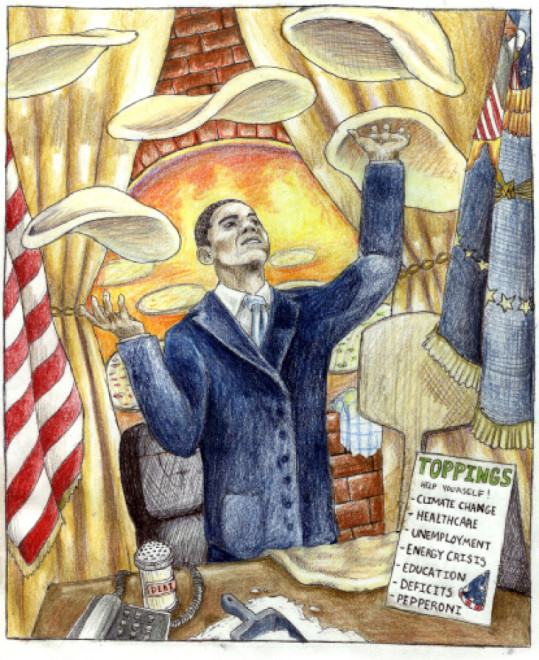The Presidency is Not a Pizza Franchise
As President Barack Obama prepares to run for a second presidential term in the face of a terribly sluggish economy, many disillusioned voters are questioning whether the United States’ next president should have prior experience running a business. As someone who had spent minimal time in the private sector before entering politics, President Obama has come under fire from conservatives who believe that he simply does not understand how to promote job creation. After all, these conservatives say, if the president has never held a real job in his life, how should he be expected to create millions of them for the country’s unemployed?
This line of thinking has been on display during the recent slate of debates for the Republican presidential primary, where business-oriented candidates routinely tout their entrepreneurial resumes. Herman Cain, the former CEO of Godfather’s Pizza, regularly claims that he has the most business experience of any contender in the field. Mitt Romney, who has been running for elected office since 1994, likes to claim that he “has spent [his] life in the private sector.” The veracity of these assertions, particularly those of Romney, is oftentimes questionable. But the fact that the candidates continue to make them underscores the fact that a sizeable portion of the electorate values the idea of a president who has spent time in business.
The first problem with this reasoning is that it bestows too much credibility to a candidate solely based on his professional background. A candidate’s experience in the private sector does not necessarily imply that his policy proposals are conducive to job creation. With regards to Herman Cain specifically, some in the business community are skeptical that his famous “9-9-9” plan will lower unemployment. Part of the plan includes a 9% consumption tax, which in the short-term could discourage consumers from spending. “Every CEO says the reason they’re not hiring is because they’re not seeing demand,” says Rachelle Bernstein, Vice President of the National Retail Federation. “An additional tax on consumer spending will negatively impact that already weak demand.”
Interestingly, recent history suggests that presidents with backgrounds in business have not necessarily overseen great economic success. The most recent businessman-turned-president was George W. Bush, who turned a federal surplus into trillions of dollars of debt and left office in the wake of the financial crisis of 2008. His father, George H.W. Bush, is the second most recent president with business experience, and he was defeated after one term in 1992 in large part due to an unemployment rate near 8%. It is interesting to note that Bill Clinton, who was an attorney before entering politics, stewarded the economy to robust growth and low unemployment during his term. This is not to suggest that business experience is in some way disadvantageous to managing the country’s economy, but it does seem to reveal that there is no correlation between being a successful entrepreneur and overseeing strong job creation from the White House.
The reason for this is that running a small business and managing the U.S. macro-economy as President of the United States are two fundamentally different tasks. The next president will be responsible for stimulating growth in an anemic economy; combating widespread unemployment, which is currently over 9%; reforming the existing tax code; negotiating trade agreements with other countries; reducing the federal debt by changing the structure of entitlement programs; and coming up with solutions to all of these that are both effective and politically feasible. In other words, the president has a job that is rather unlike running Godfather’s or Bain Capital. Because, at the end of the day, government is not a business, and the presidency is not a pizza franchise.
